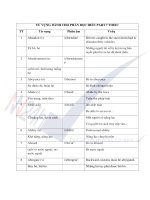TỪ VỰNG TOEIC unit 4
Bạn đang xem bản rút gọn của tài liệu. Xem và tải ngay bản đầy đủ của tài liệu tại đây (257.72 KB, 60 trang )
Unit 4
VOR CARN CRED FID CURR/CURS PED FLECT POST Words from
Mythology
Quiz 4-1 Quiz 4-2 Quiz 4-3 Quiz 4-4 Quiz 4-5 Review Quizzes 4
VOR comes from the Latin verb vorare, “to eat,” and the ending -ivorous
shows up in words that refer to eaters of certain kinds of food. Frugivorous
(for “fruit-eating”), granivorous (for “grain-eating”), and graminivorous (for
“grass-eating”) aren't too rare, but you won't run across phytosuccivorous
(“plant-sap-eating”) every day.
carnivorous
Meat-eating or flesh-eating.
• He'd gotten tired of his vegetarian guinea pigs and decided he preferred
carnivorous pets such as ferrets.
The order of mammals that Linnaeus named the Carnivora includes such
families as the dogs, the bears, the raccoons, the weasels, the hyenas, the cats,
and the seals. Most carnivores eat only meat in the wild, but some have
varied diets; some bears, for instance, normally eat far more vegetation than
meat. Carnivores have powerful jaws and complex teeth, and most are highly
intelligent. Humans, like their ape cousins, are basically omnivores (see
omnivore).
herbivorous
Plant-eating.
• In spite of their frightening appearance, marine iguanas are peaceable
herbivorous animals that feed mostly on seaweed.
Many herbivorous animals, such as rabbits, deer, sheep, and cows, are noted
for their gentle and passive ways. But such behavior is not universal among
herbivores. Rhinoceroses and elephants, for instance, are capable of inflicting
serious damage if threatened, and among dinosaurs, the herbivorous
Diplodocus had a thick tail that could be used as a lethal weapon against
attacking carnivores. Herbivorous humans are usually called vegetarians.
insectivorous
Feeding on insects.
• Their rather odd 12-year-old son kept insectivorous plants in his bedroom
and fed them live flies.
A wide variety of animals could be called insectivores—most of the birds, for
example, as well as the spiders. Of the amphibians, frogs and many lizards
are largely insectivorous. Even some fish get much of their food from insects.
The order of mammals called Insectivora contains the shrews, moles, and
hedgehogs, though bats and anteaters are also insectivores. Many insects are
themselves insectivores; the dragonfly, for instance, is a swift insectivorous
terror that lives up to its name. But it's the insectivorous plants that tend to
fascinate us; of the over 600 species, the best known are the Venus flytrap
(which snaps shut on its prey), the pitcher plants (which drown insects in a
tiny pool of water), and the sundews (which capture insects with their sticky
surfaces).
voracious
Having a huge appetite.
• One of the hardest parts of dieting is watching skinny people with voracious
appetites consume large amounts of food without gaining weight.
Voracious can be applied to people, animals, and even things, and doesn't
always refer to consuming food. Thus, teenagers are voracious eaters; you
may become a voracious reader on vacation; and Americans have long been
voracious consumers. The most voracious bats may eat three-quarters of their
weight in insects in a single night. Some countries have a voracious appetite
for oil. Voracious corporations keep “swallowing” other companies through
mergers.
CARN comes from a Latin word meaning “flesh” or “meat.” Carnation
originally meant “the color of flesh,” which was once the only color of the
flower we call the carnation. In Christian countries, Lent is the period when
the faithful traditionally give up something they love, often meat. The days
leading up to Lent are known as the carnival season, from the Italian
carnelevare, later shortened to carnevale, which meant “removal of meat”—
though during carnival, of course, people indulge in just about everything,
and the removal of meat only comes later.
carnage
Great destruction of life (as in a battle); slaughter.
• Countries around the world appealed to all sides of the conflict to stop the
carnage of the war in Bosnia.
This word was taken over straight from French (a Latin-based language), and
has mostly referred to large-scale killing in wartime. But carnage needn't
refer only to slaughter on the battlefield. With tens of thousands of people
dying each year in automobile accidents, it's appropriate to speak of carnage
on the nation's highways. And those concerned about the effects of the
violence we see constantly on TV and movie screens may refer to that as
carnage as well.
carnal
Having to do with bodily pleasures.
• The news stories about students on Spring Break tend to focus on the carnal
pleasures associated with the annual ritual.
In Christianity in past centuries, carnal was often used as the opposite of
spiritual, describing what are sometimes called “the pleasures of the flesh.”
Thus, gluttony—the consumption of excessive food and drink—was a deadly
carnal sin, whereas the holiest monks and hermits might eat hardly anything
and never touch wine. Today carnal has a somewhat old-fashioned sound;
when we use it, we generally mean simply “sexual.”
incarnate
human body.
Given bodily or actual form; especially, having
• For the rest of his life, he would regard his childhood nanny as goodness
incarnate.
Incarnate often has a religious ring to it, since for centuries it has been used
in the Christian church, which regards Jesus as the incarnation of God—that
is, as God made human. Surprisingly, neither word appears in Bible
translations; instead, the Latin word incarnatus appears in the Christian
creeds (basic statements of belief) and the Catholic Mass. Regardless,
incarnate soon began to be used with various nouns: “the devil incarnate,”
“evil incarnate,” etc. Notice that incarnate is one of the rare adjectives that
usually, but not always, follows its noun. Incarnate is also a verb, though
with a slightly different pronunciation: “This report simply incarnates the
prejudices of its authors,” “For her followers, she incarnates the virtue of
selflessness,” etc.
reincarnation
(1) Rebirth in new bodies or forms of
life. (2) Someone who has been born again with a new body after death.
• Even as a child he struck everyone as a reincarnation of his grandfather, not
in his features but in his manner and personality.
It's easy to make fun of people who claim to be the reincarnation of Cleopatra
or Napoleon, but they don't come from a culture that takes reincarnation
seriously. In Hindu belief, a person must pass through a series of
reincarnations—some of which may be as insects or fish—before fully
realizing that the bodily pleasures are shallow and that only spiritual life is
truly valuable; only then do the reincarnations cease. For Hindus, an “old
soul” is a person who seems unusually wise from early in life, and whose
wisdom must have come from passing through many reincarnations.
Quiz 4-1
A. Indicate whether the following pairs have the same or different
meanings:
1. carnage / slaughter
same ___ / different ___
2. insectivorous / buglike
same ___ / different ___
3. reincarnation / rebirth
same ___ / different ___
4. voracious / extremely hungry
same ___ / different ___
5. carnal / spiritual
same ___ / different ___
6. herbivorous / vegetarian
same ___ / different ___
7. incarnate / holy
same ___ / different ___
8. carnivorous / meat-eating
same ___ / different ___
Answers
B. Fill in each blank with the correct letter:
a. reincarnation
b. insectivorous
c. carnage
d. carnivorous
e. voracious
f. herbivorous
g. carnal
h. incarnate
1. Sheep, cattle, and antelope are ___; unlike dogs and cats, they show no
interest in meat.
2. The school tried to shield students from ___ temptations.
3. The smallest mammal is the bumblebee bat, an ___ creature about the size
of a dime.
4. Today he speaks of his former stepfather as evil ___, and his mother
doesn't argue with him.
5. From the variety of books on his shelves, we could tell he was a ___
reader.
6. Even the ambulance drivers were horrified by the ___ of the accident.
7. As a child she loved to watch them throw meat to the ___ ones, especially
the lions and tigers.
8. The current Dalai Lama is said to be the 13th ___ of the first one, who
lived in the 15th century.
Answers
CRED comes from credere, the Latin verb meaning “to believe” or “to
entrust.” We have a good credit rating when institutions trust in our ability to
repay a loan, and we carry credentials so that others will believe that we are
who we say we are.
credence
Mental acceptance of something as true or real; belief.
• He scoffed and said no one still gives any credence to the story of the Loch
Ness monster.
Credence is close in meaning to belief, but there are differences. Unlike
belief, credence is seldom used in connection with faith in a religion or
philosophy. Instead credence is often used in reference to reports, rumors,
and opinions. And, unlike belief, it tends to be used with the words give, lack,
lend,and gain. So a new piece of evidence may lend credence to the alibi of a
criminal suspect. Claims that a political candidate can become the next
President gain credence only after the candidate wins a few primaries. And
although stories about Elvis sightings persist, they lack credence for most
people.
credible
(1) Able to be believed; reasonable to trust or believe.
(2) Good enough to be effective.
• Because of her past criminal record, the defense lawyers knew she wouldn't
be a credible witness.
Credible evidence is evidence that's likely to be believed. A credible plan is
one that might actually work, and a credible excuse is one your parents might
actually believe. And just as credible means “believable,” the noun credibility
means “believability.” (But we no longer use incredible to mean the literal
opposite of credible, just as we no longer use unbelievable as the literal
opposite of believable.) Since cred is short for credibility, “street cred” is the
kind of credibility among tough young people that you can only get by
proving yourself on the mean streets of the inner city.
credulity
little evidence.
Readiness and willingness to believe on the basis of
• Thrillers and action movies only succeed if they don't strain our credulity
too much.
A particularly far-fetched story may be said to strain credulity, stretch
credulity, put demands on our credulity, or make claims on our credulity.
Credulity is a quality of innocent children (of all ages) and isn't always a bad
thing; it must have been pure credulity that enabled Chicago White Sox and
Philadelphia Phillies fans to wait so long for a World Series victory (“This is
the year they're going to take it!”), which probably made life bearable for
them. The related adjective is credulous. F. Scott Fitzgerald once defined
advertising as “making dubious promises to a credulous public.”
credo
(1) A statement of the basic beliefs of a religious faith. (2)
A set of guiding principles or beliefs.
• She claims she made her money on Wall Street just by following the old
credo “Buy low, sell high.”
Credo comes straight from the Latin word meaning “I believe,” and is the
first word of many religious credos, or creeds, such as the Apostles' Creed
and the Nicene Creed. But the word can be applied to any guiding principle
or set of principles. Of course, you may choose a different credo when you're
52 than when you're 19. But here is the credo of the writer H. L. Mencken,
written after he had lived quite a few years: “I believe that it is better to tell
the truth than to lie. I believe that it is better to be free than to be a slave. And
I believe that it is better to know than to be ignorant.”
FID comes from fides, the Latin word for “faith” or “trust.” Fidelity is
another word for “faithfulness.” Confidence is having faith in someone or
something. An infidel is someone who lacks a particular kind of religious
faith. And the once-popular dog's name Fido is Latin for “I trust.”
affidavit
A sworn statement made in writing.
• The whole family had signed affidavits stating that they believed the will to
be valid.
In Latin, affidavit means “he (she) has sworn an oath,” and an affidavit is
always a sworn written document. If it contains a lie, the person making it
may be prosecuted. Affidavits are often used in court when it isn't possible
for someone to appear in person. Police officers must usually file an affidavit
with a judge to get a search warrant. Affidavits (unlike similar signed
statements called depositions) are usually made without an opposing lawyer
being present and able to ask questions.
diffident
Lacking confidence; timid, cautious.
• He always found it a struggle to get his most diffident students to speak in
front of the class.
Diffident means lacking faith in oneself—in other words, the opposite of
confident. Distrust in your abilities or opinions usually makes you hesitate to
speak or act. Patients who feel diffident around their doctors, for example,
don't dare ask them many questions. A helpful friend tries to instill
confidence in place of diffidence.
fiduciary
Held in trust for another.
(1) Having to do with a confidence or trust. (2)
• Pension-fund managers have a fiduciary responsibility to invest the
pension's funds for the sole benefit of those who will receive the pensions.
A fiduciary relationship is one in which one person places faith in another.
Stockbrokers and real-estate agents have fiduciary duties to their clients,
which means they must act in their clients' best financial interests. Members
of a company's board of directors have a fiduciary responsibility to protect
the financial interests of the company's shareholders. There are legal
requirements for those with fiduciary responsibility, and they can be sued for
breach of fiduciary duty if they fail.
perfidy
Faithlessness, disloyalty, or treachery.
• While working for the CIA he was lured into becoming a double agent, and
it seems he paid a high price for his perfidy.
The perfidious Benedict Arnold plotted with the British to surrender West
Point to them during the American Revolution—an act that made his name a
synonym for traitor. In recent years, the perfidy of the double agents Aldrich
Ames (of the CIA) and Robert Hanssen (of the FBI) has become notorious.
Quiz 4-2
A. Fill in each blank with the correct letter:
a. perfidy
b. credible
c. diffident
d. credulity
e. credo
f. affidavit
g. fiduciary
h. credence
1. She gave little ___ to his story about his deranged girlfriend and the
kitchen knife.
2. Their account of the burglary didn't strike investigators as ___, and the
insurance company refused to pay.
3. For her own best friend to take up with her former husband was ___ that
could never be forgiven.
4. He's so ___ that you'd never believe he gives talks in front of international
organizations.
5. The family trust had been so badly mismanaged that it appeared there had
been a violation of ___ responsibility.
6. The company's odd but charming ___ was “Don't be evil.”
7. The ___ stated that no oral agreement had ever been made.
8. Her ___ is enormous; no story in the supermarket tabloids is too farfetched for her.
Answers
B. Match the definition on the left to the correct word on the right:
1. bad faith
a. perfidy
2. timid
b. credible
3. acceptance
c. diffident
4. trust-based
d. credulity
5. sworn document e. credo
6. believable
f. affidavit
7. principles
g. fiduciary
8. trustfulness
h. credence
Answers
CURR/CURS comes from currere, the Latin verb meaning “to run.”
Although words based on this root don't tend to suggest speed, the sense of
movement remains. Current, for instance, refers to running water in a stream
or river, or electrons running through a wire, and an excursion is a trip from
one place to another.









